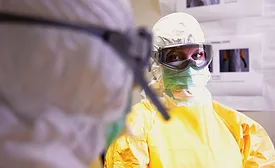Home » Keywords: » bioterrorism
Items Tagged with 'bioterrorism'
ARTICLES
Security News -- Counter Terrorism
Boston Subway System to be Biological Agent Sensor Testing Site
August 27, 2012
Medicine Delivered Right to Homes
In Anthrax Attack Test, USPS Letter Carriers Delivered the Doses
Experiment Evaluated with It Works Outcome
August 15, 2012
Project Impacts 2 Million Households
Postal Workers Participate in Bioterrorism Response Drill
Bottles of Medicine Hand Delivered
July 13, 2012
Safety Also Questioned
Bioterror Security Lapses at CDC Lab, Doors Left Unlocked
Emails Indicate Ongoing Problems
June 29, 2012
Security News -- Physical Security
Security Lapses Discovered at CDC Bioterror Lab
June 27, 2012
Medicine to Homes in Sunday Text
USPS Letter Carriers in Bioterror Attack First Responder Experiment
Supplements Sending People to Central Locations
April 28, 2012
Sign-up to receive top management & result-driven techniques in the industry.
Join over 20,000+ industry leaders who receive our premium content.
SIGN UP TODAY!Copyright ©2026. All Rights Reserved BNP Media.
Design, CMS, Hosting & Web Development :: ePublishing


